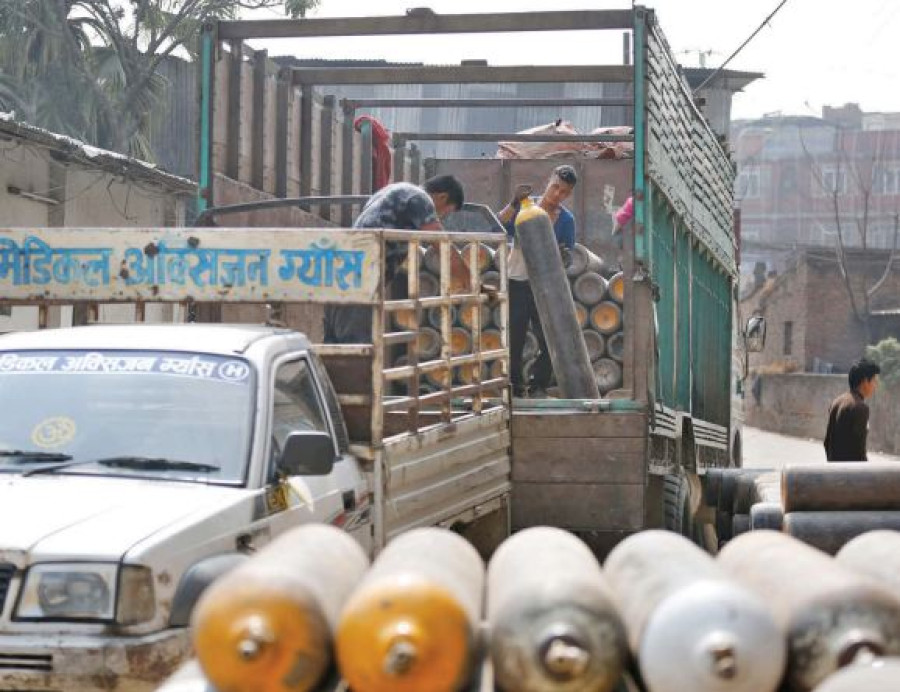Health
Most hospitals do not have ready supply of oxygen
Experts criticise lax preparations as the Health Ministry projects an additional 300,000 Covid-19 cases by July.
Arjun Poudel
Doctors have warned that failure to ensure oxygen supply at hospitals could exacerbate coronavirus death rate, but most hospitals treating Covid-19 patients do not have a ready supply of oxygen.
Out of 185 hospitals across the country, only 26 have oxygen plants and not all of them are in operation.
“Supply of oxygen is critical for the treatment of patients who are seriously ill. A lot of lives could be saved with oxygen therapy,” Dr Basudev Pandey, former director at the Epidemiology and Disease Control Division, told the Post.
The country is going through a second wave of Covid-19 infections. Infection numbers are rising and Intensive care unit beds allocated for Covid-19 patients are filling up across the country.
If the latest projection of the Ministry of Health and Population is anything to go by, things are likely to get worse in the coming days.
The ministry estimates that an additional 300,000 people could be infected with the virus by July 15 and the daily cases could reach up to 11,000.
Should such a scenario come to pass, health experts say hospitals will be hit by oxygen shortage and many patients could die unnecessarily. But the authorities concerned seem to be unprepared for such a situation.
“We cannot wait for a crisis to hit and think of a solution. Preparations should already be in place, but this has not happened,’ Dr Sarad Onta, a public health expert, told the Post.
Nepal recorded 1,667 infections and 11 deaths in the last 24 hours, according to the data released by the Health Ministry on Tuesday afternoon. It was the third consecutive day that the number of cases had crossed 1,000 mark.
Among those people who tested positive for Covid-19 in the last 24 hours, the ministry said 193 were under 20 years. The ministry added that 160 people were admitted to intensive care units and 45 others were on ventilator support.
Many health facilities in Kathmandu Valley are currently occupied by seriously infected people. This, doctors say, is because most people are seeking treatment only after their health conditions deteriorate.
With new cases on the rise, the government on Monday issued various restrictions in order to contain the virus spread.
Onta, the public health expert, fears the latest curbs against Covid-19 could come as too little too late.
“We had sufficient time for preparations at the initial days of the pandemic and this time as well,” he said. “But we are only scrambling to enforce restrictive measures in the last hour.”
When new cases started declining after November last year, authorities dismantled the quarantine and isolation facilities. Furthermore, the number of tests was not increased and contact tracing was not resumed despite suggestions from public health experts.
“Even if the number of new cases was declining, the pandemic was not over and we had not won the pandemic,” Dr Mingmar Gyelgen Sherpa, former director general at the Department of the Health Services, told the Post. “Authorities should start case management— ensure oxygen supply up to the health post level, make contact tracing effective and increase testing.”
Pandey, the former director at the Epidemiology and Disease Control Division, believes with only symptomatic people undergoing tests, the number of Covid-19 cases could be much higher.
“Real number of infections might be 10 time more than the daily count as only the symptomatic people have been undergoing the tests,” he told the Post. “Authorities should direct all health facilities to treat the infected patients and assist those facilities in the treatment.”
Meanwhile, Minister for Health and population Hridayesh Tripathi on Tuesday urged the general public not to take the ongoing infection lightly and strictly follow the safety measures.
“The government does not want to enforce another lockdown, but we will be left with no option if we do not follow the safety measures,” Tripathi said while addressing a virtual press meet at the ministry.
Dr Krishna Prasad Paudel, director at the Epidemiology and Disease Control Division, said the coming nine weeks could be challenging.
“With new variants of the virus circulating, more people could be infected,” he warned.




 15.12°C Kathmandu
15.12°C Kathmandu














